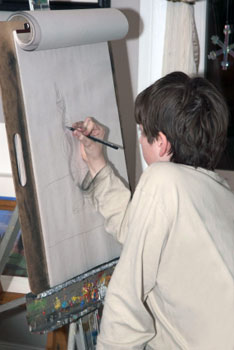 “Explore new hobbies such as woodworking, painting, or jewelry making.”
“Explore new hobbies such as woodworking, painting, or jewelry making.”Teens going through a tough depression or similar illness need ways to cope. Here are 12 of the top coping skills:
- Do a puzzle together.
- Watch an old television series while you play a simple card game. My daughter and I worked our way through Columbo, Murder She Wrote, and The Office.
- Go for a car ride with your teen in the passenger seat, listening to their favorite music; no talking. This can really soothe a teen in pain.
- If it’s been a bad day, suggest that they go to bed early. This almost always works.
- If shopping for clothes is too strenuous for them, do some Internet shopping. Having packages coming may give them something to look forward to.
- Go for a twenty-minute walk together.
- Bake something easy together.
- Suggest that they start or resume music lessons.
- Buy magazines that interest them.. Short articles require less energy than do books.
- See if they will go to a movie with a friend. It requires less conversation than other activities and is therefore less of a strain.
- Explore new hobbies such as woodworking or jewelry making. Browse through a crafts store to see what interests your teen.
- Adopt a pet through the humane society, preferably one already trained so that you don’t have the added stress of housebreaking.
You may be disappointed to discover that your teen has lost interest in an activity or sport they previously loved. It’s possible that they don’t have the level of concentration to pursue it right now. Their skill level may be so low compared to the way it was before the illness that they don’t have the heart to keep it up right now. Although you may be tempted to keep your teen involved so that they don’t lose ground, resist the urge. I know there’s the risk that they won’t return to it, but there is an equally good chance that they will find something new to master. Changing interests is a natural part of teen life anyway, so encourage them to try new things.
 “…helping a teen recover from bipolar disorder requires an all-out effort”
“…helping a teen recover from bipolar disorder requires an all-out effort”